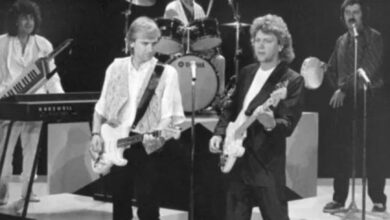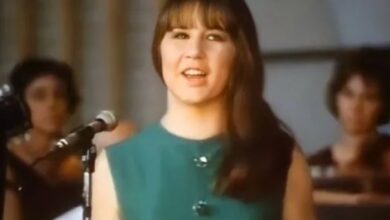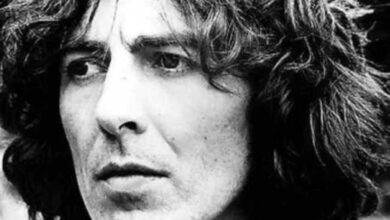Bee Gees’ “Too Much Heaven” Elevates Pop to Soulful Heights and Symbolizes a New Era of Global Generosity in 1978
Released in late 1978 during the pinnacle of the Bee Gees’ global dominance, “Too Much Heaven” stood apart as a tender, introspective ballad amid a sea of disco anthems. Issued as a single from the soundtrack to the Spirits Having Flown album, it quickly soared to the top of charts across the world, including the U.S. Billboard Hot 100 where it held the number one spot for two weeks in early 1979. While the group had already conquered the dancefloor with “Stayin’ Alive” and “Night Fever,” “Too Much Heaven” proved their emotional balladry was just as powerful—perhaps even more so.
By this point, the Bee Gees—Barry, Robin, and Maurice Gibb—were not just pop stars; they were a cultural phenomenon. Having begun their journey in the 1960s with baroque pop classics like “Massachusetts,” their transformation into the kings of disco had redefined the genre’s sound and reach. With their impossibly tight harmonies, distinct falsetto-led melodies, and genre-blending sensibilities, the Gibb brothers had managed to remain relevant across musical epochs. “Too Much Heaven” marked yet another reinvention—one that highlighted their soulful core, detached from the glittering pulse of disco.
The genesis of the song was deeply rooted in a spirit of giving. Written by all three Gibb brothers, the song was offered as a gift to UNICEF, with all royalties donated to the organization’s world hunger fund. Barry Gibb later shared that the group intentionally wanted to donate something significant—not just financially but emotionally. As such, “Too Much Heaven” became more than a chart-topper; it was a global anthem of compassion. Its lyrics speak of love so profound it feels impossible to attain—“Nobody gets too much heaven no more”—a metaphor that resonated with audiences in a world still grappling with inequality and conflict.
Recorded during a remarkably creative period for the group, the track was laid down at Criteria Studios in Miami and featured the Bee Gees’ signature falsetto harmonies, anchored by Barry’s soaring lead. The production, lush yet restrained, included orchestral arrangements by Albhy Galuten and Karl Richardson, longtime collaborators who helped refine the Bee Gees’ mature sound. Maurice’s bass lines added a velvety texture beneath the vocals, and the use of layered harmonies, while intricate, never overwhelmed the emotional vulnerability at the heart of the song.
Upon release, “Too Much Heaven” was met with both critical and commercial acclaim. It became the Bee Gees’ sixth consecutive number-one single in the U.S.—a feat that placed them in the same league as the Beatles and Elvis Presley. Internationally, the song topped charts in Canada, Italy, and Switzerland, and it became a Top 10 hit in numerous other countries. Critics praised its sincerity and elegance, noting its contrast to the frenetic energy of disco and welcoming its return to melodic balladry.
Culturally, the song arrived at a pivotal moment. In the wake of their overwhelming success in Saturday Night Fever, the Bee Gees were at risk of being boxed into a single genre. “Too Much Heaven” reminded the world of their artistic range. It helped recalibrate the public’s perception of the group, showing they were capable of deep, nuanced songwriting outside the confines of the dancefloor. Furthermore, the song’s association with UNICEF gave it a broader humanitarian resonance rarely seen in pop music at the time.
For the Bee Gees themselves, “Too Much Heaven” was a career milestone. Not only did it bolster their legacy as songwriters and performers, but it also introduced them to new audiences. The group performed the song at the Music for UNICEF Concert in January 1979 at the United Nations General Assembly in New York, alongside other legends like Donna Summer and Earth, Wind & Fire. That performance alone reached millions and became a defining moment in music diplomacy, cementing their role not just as entertainers, but as global citizens.
The track’s influence echoed through the works of other artists who began to explore similar themes of intimacy and spiritual yearning in mainstream music. Its success demonstrated that a softer, more reflective sound could co-exist with the prevailing disco wave. In time, it would become one of the templates for adult contemporary pop, paving the way for acts like Lionel Richie, Michael Bolton, and even early Whitney Houston to dominate charts with ballads that carried both heart and polish.
Over the years, “Too Much Heaven” has been covered by a wide range of artists, from soul icon Al Green to modern R&B and pop performers. Each interpretation tends to lean into the emotional richness of the original, though few can replicate the precise vocal alchemy of the Gibb brothers. The song was also included in the Bee Gees Greatest compilation and has appeared on countless love song playlists, wedding ceremonies, and memorial tributes.
At the time of its release, the Bee Gees were experiencing both public adulation and personal strain. Fame had brought its pressures, and the relentless schedule began to wear on the trio. Yet songs like “Too Much Heaven” revealed a deeper unity within the group—an ability to come together and create something both intimate and globally resonant. The charitable aspect of the song gave them a rare kind of legacy—art not just as expression, but as impact.
Decades after its release, “Too Much Heaven” continues to enjoy steady radio play and remains one of the most streamed Bee Gees ballads. Its inclusion in retrospectives, film soundtracks, and tribute performances underscores its enduring appeal. The song is often cited as one of the Bee Gees’ most emotionally stirring works—a bridge between their baroque past and their soulful maturity.
In a broader sense, the track helped expand the definition of what pop music could be. It challenged the idea that falsetto-led harmonies were limited to the dancefloor, introducing a more spiritual, almost gospel-inflected mood into the pop mainstream. In doing so, it paved the way for greater vocal experimentation in commercial music.
Following Maurice Gibb’s passing in 2003 and Robin’s in 2012, “Too Much Heaven” gained renewed poignancy. Barry Gibb has performed the song solo in tribute to his brothers, often with a trembling voice and tears in his eyes—proof that the song’s emotional power only deepens with time. Its message, of love as a rare and cherished gift, seems all the more profound in light of their story.
Ultimately, “Too Much Heaven” remains a cornerstone of the Bee Gees’ legacy. It’s a song that speaks quietly yet profoundly about the rarity of true affection and the importance of generosity—not just of money, but of spirit. In a catalog filled with dazzling hits, this ballad stands out for its heart, reminding us that music can heal, inspire, and give voice to our highest hopes.





